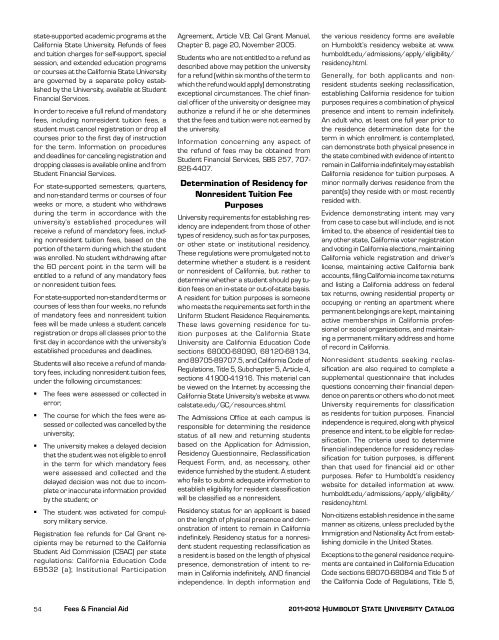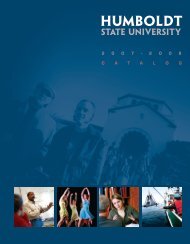2011-12 Academic Year - Bad Request - Humboldt State University
2011-12 Academic Year - Bad Request - Humboldt State University
2011-12 Academic Year - Bad Request - Humboldt State University
You also want an ePaper? Increase the reach of your titles
YUMPU automatically turns print PDFs into web optimized ePapers that Google loves.
state-supported academic programs at the<br />
California <strong>State</strong> <strong>University</strong>. Refunds of fees<br />
and tuition charges for self-support, special<br />
session, and extended education programs<br />
or courses at the California <strong>State</strong> <strong>University</strong><br />
are governed by a separate policy established<br />
by the <strong>University</strong>, available at Student<br />
Financial Services.<br />
In order to receive a full refund of mandatory<br />
fees, including nonresident tuition fees, a<br />
student must cancel registration or drop all<br />
courses prior to the first day of instruction<br />
for the term. Information on procedures<br />
and deadlines for canceling registration and<br />
dropping classes is available online and from<br />
Student Financial Services.<br />
For state-supported semesters, quarters,<br />
and non-standard terms or courses of four<br />
weeks or more, a student who withdraws<br />
during the term in accordance with the<br />
university’s established procedures will<br />
receive a refund of mandatory fees, including<br />
nonresident tuition fees, based on the<br />
portion of the term during which the student<br />
was enrolled. No student withdrawing after<br />
the 60 percent point in the term will be<br />
entitled to a refund of any mandatory fees<br />
or nonresident tuition fees.<br />
For state-supported non-standard terms or<br />
courses of less than four weeks, no refunds<br />
of mandatory fees and nonresident tuition<br />
fees will be made unless a student cancels<br />
registration or drops all classes prior to the<br />
first day in accordance with the university’s<br />
established procedures and deadlines.<br />
Students will also receive a refund of mandatory<br />
fees, including nonresident tuition fees,<br />
under the following circumstances:<br />
The fees were assessed or collected in<br />
error;<br />
The course for which the fees were assessed<br />
or collected was cancelled by the<br />
university;<br />
The university makes a delayed decision<br />
that the student was not eligible to enroll<br />
in the term for which mandatory fees<br />
were assessed and collected and the<br />
delayed decision was not due to incomplete<br />
or inaccurate information provided<br />
by the student; or<br />
The student was activated for compulsory<br />
military service.<br />
Registration fee refunds for Cal Grant recipients<br />
may be returned to the California<br />
Student Aid Commission (CSAC) per state<br />
regulations: California Education Code<br />
69532 (a); Institutional Participation<br />
Agreement, Article V.B; Cal Grant Manual,<br />
Chapter 8, page 20, November 2005.<br />
Students who are not entitled to a refund as<br />
described above may petition the university<br />
for a refund (within six months of the term to<br />
which the refund would apply) demonstrating<br />
exceptional circumstances. The chief financial<br />
officer of the university or designee may<br />
authorize a refund if he or she determines<br />
that the fees and tuition were not earned by<br />
the university.<br />
Information concerning any aspect of<br />
the refund of fees may be obtained from<br />
Student Financial Services, SBS 257, 707-<br />
826-4407.<br />
Determination of Residency for<br />
Nonresident Tuition Fee<br />
Purposes<br />
<strong>University</strong> requirements for establishing residency<br />
are independent from those of other<br />
types of residency, such as for tax purposes,<br />
or other state or institutional residency.<br />
These regulations were promulgated not to<br />
determine whether a student is a resident<br />
or nonresident of California, but rather to<br />
determine whether a student should pay tuition<br />
fees on an in-state or out-of-state basis.<br />
A resident for tuition purposes is someone<br />
who meets the requirements set forth in the<br />
Uniform Student Residence Requirements.<br />
These laws governing residence for tuition<br />
purposes at the California <strong>State</strong><br />
<strong>University</strong> are California Education Code<br />
sections 68000-68090, 68<strong>12</strong>0-68134,<br />
and 89705-89707.5, and California Code of<br />
Regulations, Title 5, Subchapter 5, Article 4,<br />
sections 41900-41916. This material can<br />
be viewed on the Internet by accessing the<br />
California <strong>State</strong> <strong>University</strong>’s website at www.<br />
calstate.edu/GC/resources.shtml.<br />
The Admissions Office at each campus is<br />
responsible for determining the residence<br />
status of all new and returning students<br />
based on the Application for Admission,<br />
Residency Questionnaire, Reclassification<br />
<strong>Request</strong> Form, and, as necessary, other<br />
evidence furnished by the student. A student<br />
who fails to submit adequate information to<br />
establish eligibility for resident classification<br />
will be classified as a nonresident.<br />
Residency status for an applicant is based<br />
on the length of physical presence and demonstration<br />
of intent to remain in California<br />
indefinitely. Residency status for a nonresident<br />
student requesting reclassification as<br />
a resident is based on the length of physical<br />
presence, demonstration of intent to remain<br />
in California indefinitely, AND financial<br />
independence. In depth information and<br />
the various residency forms are available<br />
on <strong>Humboldt</strong>’s residency website at www.<br />
humboldt.edu/admissions/apply/eligibility/<br />
residency.html.<br />
Generally, for both applicants and nonresident<br />
students seeking reclassification,<br />
establishing California residence for tuition<br />
purposes requires a combination of physical<br />
presence and intent to remain indefinitely.<br />
An adult who, at least one full year prior to<br />
the residence determination date for the<br />
term in which enrollment is contemplated,<br />
can demonstrate both physical presence in<br />
the state combined with evidence of intent to<br />
remain in California indefinitely may establish<br />
California residence for tuition purposes. A<br />
minor normally derives residence from the<br />
parent(s) they reside with or most recently<br />
resided with.<br />
Evidence demonstrating intent may vary<br />
from case to case but will include, and is not<br />
limited to, the absence of residential ties to<br />
any other state, California voter registration<br />
and voting in California elections, maintaining<br />
California vehicle registration and driver’s<br />
license, maintaining active California bank<br />
accounts, filing California income tax returns<br />
and listing a California address on federal<br />
tax returns, owning residential property or<br />
occupying or renting an apartment where<br />
permanent belongings are kept, maintaining<br />
active memberships in California professional<br />
or social organizations, and maintaining<br />
a permanent military address and home<br />
of record in California.<br />
Nonresident students seeking reclassification<br />
are also required to complete a<br />
supplemental questionnaire that includes<br />
questions concerning their financial dependence<br />
on parents or others who do not meet<br />
<strong>University</strong> requirements for classification<br />
as residents for tuition purposes. Financial<br />
independence is required, along with physical<br />
presence and intent, to be eligible for reclassification.<br />
The criteria used to determine<br />
financial independence for residency reclassification<br />
for tuition purposes, is different<br />
than that used for financial aid or other<br />
purposes. Refer to <strong>Humboldt</strong>’s residency<br />
website for detailed information at www.<br />
humboldt.edu/admissions/apply/eligibility/<br />
residency.html.<br />
Non-citizens establish residence in the same<br />
manner as citizens, unless precluded by the<br />
Immigration and Nationality Act from establishing<br />
domicile in the United <strong>State</strong>s.<br />
Exceptions to the general residence requirements<br />
are contained in California Education<br />
Code sections 68070-68084 and Title 5 of<br />
the California Code of Regulations, Title 5,<br />
54 Fees & Financial Aid<br />
<strong>2011</strong>-20<strong>12</strong> <strong>Humboldt</strong> <strong>State</strong> <strong>University</strong> Catalog

















